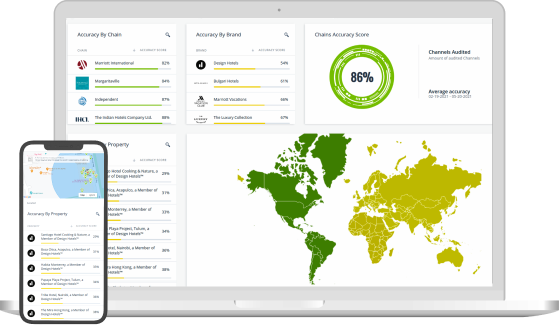It’s no secret that the Covid-19 pandemic had a major negative impact on businesses dependent on tourism and travel. Thankfully, we are beginning to see signs of a return to some type of “normal.”
As the recovery process begins, we need to face the facts that the industry itself and the behaviors of those they serve has dramatically changed. During this time, those in the hospitality industry are facing unique challenges. When approached with the right strategy, however, these challenges can transform into opportunities for growth.
For starters, there is an increasing amount of outdated information on hotel and travel websites. This information gap can be detrimental to businesses attempting to recover, leading to confused and aggravated customers. Although this has been an area where I’ve watched hotels struggle for years, the issue became clearer as many struggles to recover after the massive losses suffered in 2020. Content needs to be consistent and accurate across all channels, and it has a direct impact on revenue.
Now, hotel leaders have the opportunity to streamline content processes that they may have let go of in the past. Companies such as HotelPORT are available to help turn this industry challenge into an opportunity for growth.
An additional problem facing travel and hospitality businesses is employee retention. The industry is known for its high turnover rate with about ⅓ of workers quitting after 6 months. To overcome this, organizations need to adapt to the changing workforce. This starts by staying up to date on the latest trends. According to HotelTechReport, the major workforce trends hotel managers need to look for in 2021 include “a growing focus on safety, unionization, “gig” work, and human resources technology.” Being cognizant of this and making the appropriate adjustments will help increase employee retention and make sure you are attracting high-quality talent.
More than ever, consumers are relationship-driven. They choose brands based on trust. Nowadays, consumers develop trust based on what they read online (reviews on Facebook, Instagram, Yelp, TripAdvisor, etc.) It is time for hotels to take control of their reputation management by utilizing these platforms. Address negative comments head-on and encourage people to post their own reviews if they have a positive experience.
Finally, this is the time for the hospitality industry to update its systems to create a personalized customer experience. Due to the rise in eCommerce, travelers have grown to expect streamlined and personalized shopping experiences. This will without a doubt translate to the hospitality industry, which needs to be prepared. To keep a competitive edge, businesses need to look at tools to help them translate data, such as past buying history and interests, into an actionable strategy for personalization.
Without a doubt, 2020 was one of the most challenging years in the industry. At the same time, it has presented organizations the opportunity to face challenges head-on and ultimately come out the other side more successful.



